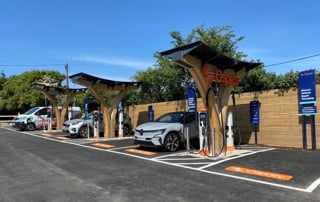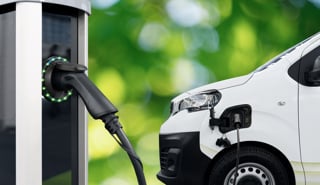Growth in fleet electrification and the level of support offered by employers for company car and van drivers to charge their electric vehicles (EVs) are revealed in new research.
The survey, commissioned by Fuel Card Services, shows that more than three-quarters (79%) of respondents aim to deploy EVs to their fleet within the next six months, while an incredible 98% of fleets intend to acquire an EV within the next year.
Fleets have dominated the registrations of new EVs thanks to low benefit-in-kind (BIK) tax rates and the growth in salary sacrifice EV-only schemes for employees.
Recent data from Cap HPI showed that in the first two months of the year, battery electric vehicles (BEVs) accounted for more than a third (35%) of the fleet market, while diesel and petrol market share stood at 4.5% and 28.1%, respectively.
Plug-in hybrid (PHEV) market share for the fleet sector, meanwhile, stood at 26.6% in the first two months of 2024.
Half of the 250 fleets surveyed by Censuswide also said that the majority of new vehicles joining their fleet would be electric.
One-in-five respondents (20%) planned on adopting a combination of internal combustion engine (ICE) and electric vehicles, favouring no particular powertrain.
Just one-in-10 said that their fleet growth would consist purely of petrol and diesel vehicles.
Tom Cosway, head of commercial at Fuel Card Services, told Fleet News: “Seeing that approximately 79% of fleets plan to incorporate EVs within the next six months underscores a widespread belief that a sustainable transition is now not just about company values; it is also about what’s good for business, and for employees.
“With electric vehicle ranges and options constantly improving, and public charging infrastructure rapidly expanding, many of the previous barriers to EV adoption are diminishing.
“Adding to this the clear benefits that fleet drivers gain from switching to electric, it’s easy to see why nearly all fleet operators now view EVs as a no-brainer for the vast majority of use cases, regardless of fleet size.”
Fleet operators identified costs, operational efficiencies, and company values as the biggest drivers of sustainable change within their organisations.
However, with fleets facing increased costs, survey respondents were wary of the potential impact of the cost-of-living crisis, with a third of fleets (32%) expecting it to “significantly” delay fleet electrification.
Just one-in-six (18%) believed it would have “little” impact on electrification plans.
Support for EV charging

The nationwide survey of fleets operating from 1-1,000 vehicles, including cars, vans and trucks, found a significant level of support for employees when it came to charging their EV.
Nine out of 10 respondents, some 90%, provided at-work charging facilities for EV drivers to charge their vehicles, while almost two-thirds (61%) said that they helped with the cost of installing a home charger.
A third (33%) of respondents offered employees access to an interest free loan to pay for their charge point and more than quarter (28%) paid for it outright. Just one-in-five (20%) received no financial support.
“In an evolving landscape, it’s vital that fleet solutions and services cater to the changing needs of business fleets and support them in transitioning as seamlessly as possible,” said Cosway.
To read more on the fleet electrification research from Fuel Card Services, click here.























Login to comment
Comments
No comments have been made yet.